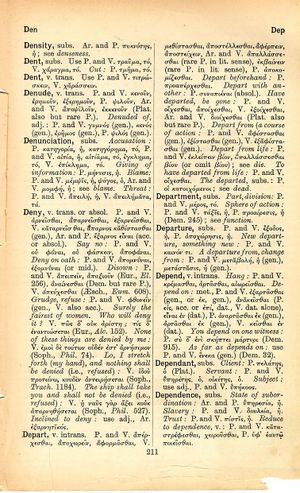depart: Difference between revisions
μή μοι θεοὺς καλοῦσα βουλεύου κακῶς· πειθαρχία γάρ ἐστι τῆς εὐπραξίας μήτηρ, γυνὴ Σωτῆρος· ὦδ᾽ ἔχει λόγος → When you invoke the gods, do not be ill-advised. For Obedience is the mother of Success, wife of Salvation—as the saying goes.
(CSV3) |
m (Woodhouse1 replacement) |
||
| Line 1: | Line 1: | ||
{{Woodhouse1 | {{Woodhouse1 | ||
|Text=[[File:woodhouse_211.jpg|thumb|link={{filepath:woodhouse_211.jpg}}]] | |Text=[[File:woodhouse_211.jpg|thumb|link={{filepath:woodhouse_211.jpg}}]] | ||
===verb intransitive=== | |||
P. and V. ἀπέρχεσθαι, ἀποχωρεῖν, ἀφορμᾶσθαι, V. μεθίστασθαι, ἀποστέλλεσθαι, ἀφέρπειν, ἀποστείχειν, Ar. and V. ἀπαλλάσσεσθαι (rare P. in lit. sense), ἐκβαίνειν (rare P. in lit. sense), P. ἀποκομίζεσθαι. | [[prose|P.]] and [[verse|V.]] [[ἀπέρχεσθαι]], [[ἀποχωρεῖν]], [[ἀφορμᾶσθαι]], [[verse|V.]] [[μεθίστασθαι]], [[ἀποστέλλεσθαι]], [[ἀφέρπειν]], [[ἀποστείχειν]], [[Aristophanes|Ar.]] and [[verse|V.]] [[ἀπαλλάσσεσθαι]] (rare [[prose|P.]] in lit. sense), [[ἐκβαίνειν]] (rare [[prose|P.]] in lit. sense), [[prose|P.]] [[ἀποκομίζεσθαι]]. | ||
[[depart beforehand]]: [[prose|P.]] [[προαπέρχεσθαι]]. | |||
[[depart with another]]: [[prose|P.]] [[συναπιέναι]] (absol.). | |||
[[have departed]], [[be gone]]: [[prose|P.]] and [[verse|V.]] [[οἴχεσθαι]], [[ἀποίχεσθαι]], [[verse|V.]] [[ἐξοίχεσθαι]], [[Aristophanes|Ar.]] and [[verse|V.]] [[διοίχεσθαι]] ([[Plato]] also but rare [[prose|P.]]). | |||
[[depart from]] (a [[course of action]]): [[prose|P.]] and [[verse|V.]] [[ἀφίστασθαι]] (gen.), [[ἐξίστασθαι]] (gen.), [[verse|V.]] [[ἐξαφίστασθαι]] (gen.). | |||
[[depart from life]]: [[prose|P.]] and [[verse|V.]] [[ἐκλείπω βίον]], [[ἐκλείπειν βίον]], [[ἀπαλλάσσεσθαι βίου]] (or omit [[βίου]]); see [[die]]. | |||
[[to have departed from life]]: [[prose|P.]] and [[verse|V.]] [[οἴχεσθαι]]. | |||
[[the departed]], subs.: [[prose|P.]] [[οἱ κατοιχόμενοι]]; see [[dead]]. | |||
}} | }} | ||
Revision as of 08:50, 20 May 2020
English > Greek (Woodhouse)
verb intransitive
P. and V. ἀπέρχεσθαι, ἀποχωρεῖν, ἀφορμᾶσθαι, V. μεθίστασθαι, ἀποστέλλεσθαι, ἀφέρπειν, ἀποστείχειν, Ar. and V. ἀπαλλάσσεσθαι (rare P. in lit. sense), ἐκβαίνειν (rare P. in lit. sense), P. ἀποκομίζεσθαι.
depart beforehand: P. προαπέρχεσθαι.
depart with another: P. συναπιέναι (absol.).
have departed, be gone: P. and V. οἴχεσθαι, ἀποίχεσθαι, V. ἐξοίχεσθαι, Ar. and V. διοίχεσθαι (Plato also but rare P.).
depart from (a course of action): P. and V. ἀφίστασθαι (gen.), ἐξίστασθαι (gen.), V. ἐξαφίστασθαι (gen.).
depart from life: P. and V. ἐκλείπω βίον, ἐκλείπειν βίον, ἀπαλλάσσεσθαι βίου (or omit βίου); see die.
to have departed from life: P. and V. οἴχεσθαι.
the departed, subs.: P. οἱ κατοιχόμενοι; see dead.

